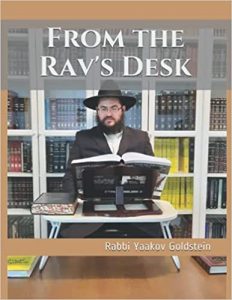
*As an Amazon Associate I earn from qualifying purchases.
The status of a girlfriend regarding needing a Get
Question:
I am a Rabbi in a certain city and have been approached by a member of my community whose daughter has gotten engaged, if I can officiate at their wedding. After inquiring, I discovered that this daughter had previously been living while in college with her on and off Jewish boyfriend [no civil marriage] for over 2 years, and has years since broken up. My question is regarding if there is any need for her to receive a halachic Get for me to be allowed to marry her. They are very secular Jews and what I have gathered it would be a big deal to get the ex-boyfriend to go through with a Get whom she has not been in contact with for years. To note, that they never got civilly married and never intended to live with each other for the sake of marriage, and they simply lived together for convenience purposes while attending the same college.
Answer:
There is no need in this case for her to receive a Get before she marries.
Explanation:
There is a well-known Talmudic concept that a Jew retains the status quo of validity [i.e. Chezkas Kashrus], and hence would not perform an action in a sinful way if it can be performed in a permitted method. Accordingly, since it is possible for one to be intimate in a permitted way through marriage, we assume that someone who had intimacy in truth had intent to do so for the sake of marriage. This concept is known as Ein Adam Oseh Beliaso Beilas Zenus. Now, while this assumption is a great Limud Zechus, or benefit of the doubt, to the perpetrator, it enters the woman into the question as to whether she now requires a Get in order to remarry, and thereby causes her to be chained down as an Eishes Ish until she receives a halachic bill of divorce. So, while there is controversy in this subject amongst the Poskim, many are of the opinion, and so is the final ruling in the Shulchan Aruch, that the above Talmudic rule was only said and applied towards one’s ex-wife [i.e. Megureshes] [or if there were Eidim present and the couple are Shomer Mitzvos], that if one divorced his wife and then was witnessed to have intimacy with her, we apply the above rule and hence require a new Get. However, if one was never married to the woman, then we do not apply the above rule and assume the relationship was promiscuous and a bill of divorce is not required. However, there is a major and famous debate regarding if this leniency applies even to a couple who had a civil marriage. The Shulchan Aruch rules regarding a couple who was forced to convert to another religion, and had a civil marriage, that here too we do not apply the above Talmudic rule, and hence it will divorce is not required. Accordingly, many Poskim of the previous and current generation rule that the common phenomenon of secular couples having a civil marriage is Halachically meaningless, and a Get is not required for them to remarry. However, other Poskim were stringent in this matter for one reason or another [such as that perhaps the civil marriage document is similar to a halachic bill of marriage], and while this major debate which began over 100 years ago has never been settled, the most accepted approach amongst Rabbanim and Batei Dinim is to rule that from the letter of the law a get is not required, although we do require it as a stringency, when possible. All the above, however, only applies if an actual civil marriage took place, however by a girlfriend and boyfriend living together, there is more room to be lenient to not require a Get even Lechumra, with exception to cases where it may be evident that they intended to live as husband and wife.
Sources: See regarding general rule of Ein Adam Oseh Beliaso Beilas Zenus: Michaber E.H. 149:1-2; Tur 149; Rambam Gerushin 10:17-18; Mishneh and Gemara Gittin 81a-b; Kesubos 73a; Encyclopedia Talmudit Vol. 1 Erech “Ein Adam Oseh Beliaso Beilas Zenus See regarding that Talmudic rule was only said by a Megureshes, and not by a Penuya: Michaber E.H. 149:5; Lenient opinion in Rama E.H. 33:1 [brings two opinions]; Rambam Gerushin 10:19; Rashba and Rosh Gittin 8; Rivash 6; Tashbeitz 3:47; Biur Hagr”a E.H. 15:17 and 26:1; Igros Moshe E.H. 4:112; Encyclopedia Talmudit Vol. 1 p. 556 Stringent: Geonim, brought in Rif Yevamos 2 and Rambam Gerushin 10:19 and Shaareiy Tzedek 17 See regarding Meshudeches: Beis Shmuel 149; Shut Haradach Beis Chaf Cheder 5; Beir Heiytiv E.H. 17:161; See regarding that even according to stringent opinion we are only Chosheish if there were Eidim present and the couple are Shomer Mitzvos: Rama E.H. 33:1; Radbaz 3:351 [not by a Parutz]; Beis Efraim E.H. 42; All Poskim who discuss civil marriage and are lenient See regarding civil marriage: Devar Avraham 29; Seridei Eish 3:22; No need for Get by Mumar: Michaber E.H. 149:6; Rama E.H. 26:1; Rivash 6; Avraham Ben Harambam 57; Tashbeitz 3:47; Chelkas Mechokeik 26:23; Lenient: Igros Moshe E.H. 1:74-77; 2:19; 3:23 and 45, 4:1, 29, 75-77, 81, 112; Chelkas Yaakov E.H. 69-74; Yabia Omer E.H. 6:1; Tzitz Eliezer 1:27; 2:19; 8:37; Ohalei Aron 50-52; Bikureiy Yehuda Lutzin 5690 3; Mishpitei Uziel E.H. 1:59; 2:54-55; Yechaveh Daas 16; Shut Beis Din London; Shut Beis Zevul 27; Oros Mishpat p. 40; Stringent: Tzafnas Paneiach 1-4; Peirushei Ivra 4 of Rav Henkin


Leave A Comment?
You must be logged in to post a comment.